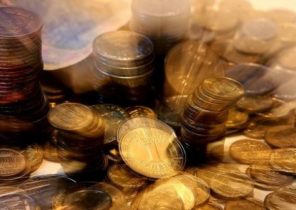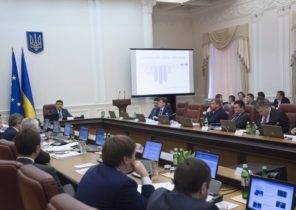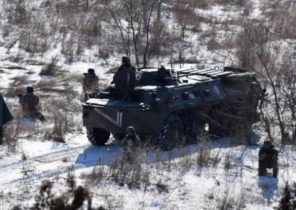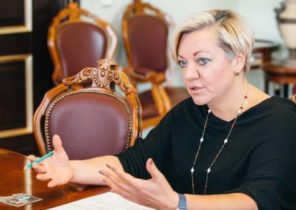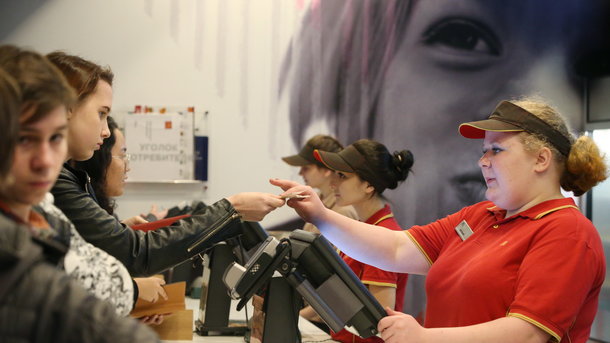
Despite a protracted crisis, Ukrainians tend optimistic to assess their present and future. This is evidenced by research company Nielsen, which experts have calculated the consumer confidence Index (SDI) for 2016 and provided exclusive information for readers Today. Thus, in the fourth quarter of 2016, the figure was 52 points, despite the fact that in the first quarter, barely up to 46 points (see infographic). That is, the positive dynamics is obvious. Why is consumer sentiment Ukrainians stabilized and people to spend free money, learned “Today.”

EVALUATION. The increase in consumer confidence of Ukrainians for six points on the year, the representatives of Nielsen called the phenomenon of “stability in crisis.” “People used and continue to adapt to the conditions, which dictate the consumer market and the economy as a whole. Unstable dollar, rising prices for food, the new tariffs for housing and communal services — the conditions in which the Ukrainian consumer has been living for the third year in a row. The data of the Institute of demography and social studies named after mV ptukha NAS say that now in Ukraine is below the subsistence level lives of 58.3% of the population. Such consumer “stability” is misleading and will be rocked during the next shock, be it the prices in the store or escalation of the conflict in the East of the country”, — says the General Director of Nielsen in Ukraine and Belarus Tatiana Immortal.
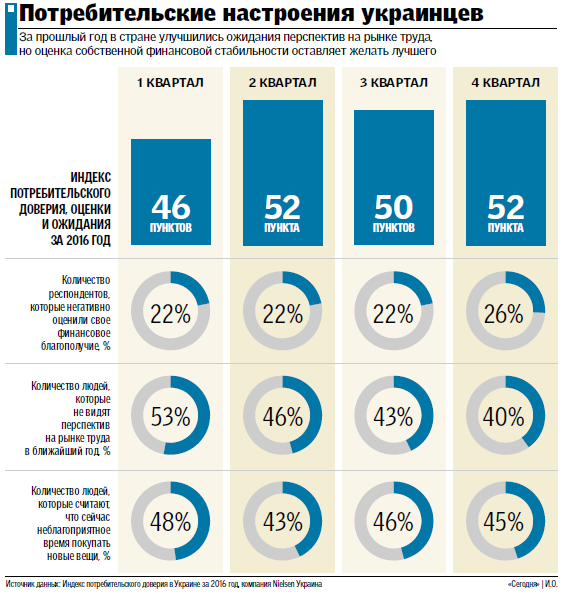
MOOD. IAPS Ukrainians for the year 2016 based on a survey of public opinion in three areas: financial prosperity, the prospects of the labor market, relevance of buying new things. According to the Nielsen study, throughout 2016, the financial position of Ukrainians continued to deteriorate. If in the first quarter of 2016 were dissatisfied with their income, only 22% of the respondents in the fourth quarter, the figure was 26%. But at the same time, people started to positively assess the prospects of the domestic labour market. This means that in early 2016, 53% of respondents did not believe that they professionally can be improved, for example, wage growth or change jobs more profitable. But closer to winter-2017 the level of skepticism has fallen 13 points, to 40%. A little better the Ukrainians were treated to shopping in a crisis. That is, in the first quarter of 2016 didn’t want often to go shopping 48% of respondents. And by the end of the year negatively to the subject purchases were treated for 45% of the respondents.
COSTS. The entire 2016 population carefully drove the income and expenses of family budgets, after all, life is expensive. And about one-third of Ukrainians in the Nielsen study paid attention that they do not have available funds after the purchase of necessities. And in the necessities of the population may have different needs, depending on income levels, pace of life and so on for some vital items in life are, conventionally, flour and salt, while other toothpaste and toilet paper. When people get free money, they invest in the purchase of clothing, gadgets, repair, entertainment, vacation, and also trying to make savings or to distribute the debt. At the same time, Ukrainians are recognized: at the end of 2016 for this purpose was able to spend less money. According to experts, the reasons are the same: exchange rate fluctuations, the increase in utility tariffs, rising prices for food.
People are afraid of rising prices and health problems
According to Nielsen ratings, last year from-for growth of tariffs of housing and communal services the level of anxiety of the population increased from 30% to 36%. As people become more concerned about their health, the figure for the year rose from 15% to 18%. But the fear of escalation of hostilities for 2016 has fallen from 38% to 33%. Calmer Ukrainians began to refer to the General state of the economy, this level went from 26% to 22%. But fears due to the rise in food prices remained unchanged for the whole year of 23%.
All it says is that Ukrainians are gradually getting used to the crisis, it’s impossible to live in constant stress, notes the head of the Secretariat of the Council of entrepreneurs under the Cabinet of Ministers Andrei Zablovsky. But to live in pink glasses too — better to be prepared for the elements. “A good recipe to minimize the consequences of the crisis could be policy savings and savings. It is also necessary to look for new opportunities to depserate. It is useful to run and interesting business projects, both innovative and social,” says Zablovsky.

